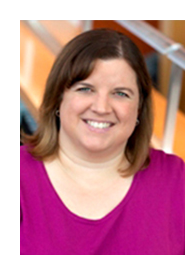PENN STATE DICKINSON LAW’S LAURA J. AX-FULTZ USES SABBATICAL TO ASK: WHERE DID ALL THE ACADEMIC LAW LIBRARIANS GO?
 February 2024 — In her position as associate dean for library and information services at Penn State Dickinson Law, Laura J. Ax-Fultz hires law library faculty, and so she keeps an eye on job openings at academic law libraries advertised by professional organizations.
February 2024 — In her position as associate dean for library and information services at Penn State Dickinson Law, Laura J. Ax-Fultz hires law library faculty, and so she keeps an eye on job openings at academic law libraries advertised by professional organizations.
In 2020, she began to notice a significant uptick in the number of open positions listed. At first, she chalked it up to just another side effect of COVID — it was the year the pandemic started, after all, and everything seemed to be impacted in unexpected ways. But as the pandemic waned, the openings remained, marking quite a change from just a few years earlier. “We went from a time of what I called a desert of open positions from 2010 to 2013, when there were rarely open positions in academic law libraries, to literally hundreds of positions posted last year,” said Ax-Fultz.
Since no one seemed to know why, she decided to investigate herself during her sabbatical, which ran from July 1 to December 31, 2023.
“The purpose of my sabbatical was to figure out why — what is happening, where are people going? Is it part of the Great Resignation? And what are the factors that are driving people to leave their positions?” said Ax-Fultz.
Conducting surveys and interviews
Before she could even start to answer those questions, Ax-Fultz had to establish some research baselines. First, she needed to determine how many academic law librarians there are in the United States. She struggled to find a reliable resource, so she counted herself.
She reached out to law libraries across the country and used American Bar Association data to track the change in number of positions in recent years. Then she had to find out why people were leaving. That proved even tougher.
Ax-Fultz focused on the period from January 2020 through June 2023. She created a survey asking people who had left their jobs about their decision, then distributed it through the American Association of Law Libraries, which has a special interest group for academic law librarians.
About a third of those who took the survey also said they would be willing to discuss their decision with Ax-Fultz in an interview. It turned out there were many reasons people left, but all shared something in common. “I think it is important to know that every person I interviewed personally loved their job and did not necessarily want to leave,” said Ax-Fultz, who will publish the results of her research later this year.
A tough time for educators
Ax-Fultz is working on two articles based on those findings. One analyzes the quantitative data she gathered from the survey. The other will focus on the qualitative data from the interviews, which she will use to offer recommendations to academic law library administrators on how to recruit, develop, and retain law librarians.
“I think that my biggest takeaway from this was the real trauma and psychological harm that people who work in higher education are experiencing right now, for many different reasons,” said Ax-Fultz. “Those 34 interviews I conducted were hard. I heard a lot of the same reasons for leaving from different people at different institutions.”
She will keep the takeaways in mind as she settles back in from her sabbatical. “For myself, I came away thinking about how I can improve communications by being a more transparent leader. The importance of that was one of the things I heard over and over in the interviews,” said Ax-Fultz.